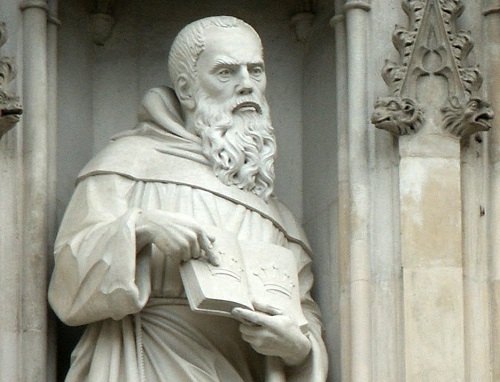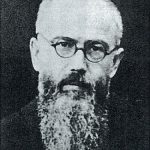
Fr. Maximilian Kolbe is well-known for volunteering to die in place of another prisoner at Auschwitz. However, his history as a pioneering entrepreneur, who used the latest technology and managerial techniques to increase his ministry’s outreach, has inspired a new movement for the pope to name him “the patron saint of entrepreneurs and start-ups.”
 The fascinating history of how the Polish Franciscan used innovative techniques, employed the latest forms of communications, and oversaw hundreds of workers is the subject of a new essay in Religion & Liberty Transatlantic titled “Maximilian Kolbe, saint of Auschwitz and entrepreneurs?” The author, Marcin Rzegocki, notes how the missionary and martyr led his monthly evangelistic publications from a first-run print of 5,000 copies to a circulation of one million during his too-brief lifetime.
The fascinating history of how the Polish Franciscan used innovative techniques, employed the latest forms of communications, and oversaw hundreds of workers is the subject of a new essay in Religion & Liberty Transatlantic titled “Maximilian Kolbe, saint of Auschwitz and entrepreneurs?” The author, Marcin Rzegocki, notes how the missionary and martyr led his monthly evangelistic publications from a first-run print of 5,000 copies to a circulation of one million during his too-brief lifetime.
“Cutting-edge technology helped him spread the Gospel. His printing machines ranked among the most modern in Europe,” he writes.
Fr. Kolbe asked professors from the best Warsaw universities to craft the managerial structure of his new “factory.” The solutions he implemented reflected the newest currents of managerial thought, in this case strongly inspired by scientific management or “Taylorism.” These practices proved effective. The circulation of Knight of Immaculata reached one million on the eve of World War II.
His indefatigable efforts included print and radio ministries, and the funding and planting of missions around the globe. He and other Franciscans left for Japan “with little money and no knowledge of Asian languages or culture. Only one month after his arrival to Nagasaki, Japan, the first printing of the Knight of Immaculata in Japanese took place, running 10,000 copies. In a few years the monthly circulation tripled,” and their monastery grew exponentially.
These and other actions, which Marcin writes about in detail, have led some Polish entrepreneurs to seek his heavenly patronage.
Their petition asks Pope Francis:
Most Holy Father, As entrepreneurs we know very well that the world of business needs inspiring role models. Only sincere inspiration can provide the strength of will and motivation needed to subdue the earth. We consider St. Maximilian Kolbe one of such people. He is best known for his heroic death in Auschwitz, where he volunteered to die in place of a stranger who was a father to a family, but we also remember him as a brilliant entrepreneur, publisher, journalist and an effective manager. The undersigned of this petition belong to various denominations and have diverse opinions, but we all believe that the achievements and life of St. Maximilian Kolbe should be a role model for the work of many entrepreneurs. That is why we, the undersigned entrepreneurs, activists, journalists and others supporting this petition, ask Your Holiness, with the utmost respect, to designate St. Maximilian Kolbe as the patron saint of entrepreneurs and start-ups beginning their business journey. We sincerely count on Your Holiness’ support on this issue, being aware of the care with which Your Holiness considers the need to build and improve the everyday world.
They have also created a documentary, “Start-up Max.”
Rzegocki describes the martyr as the perfect model of the Christian businessman seeking to balance a contemplative spiritual life and an active work life:
St. Maximilian Kolbe exemplifies the marriage of virtue and hard work in realizing extraordinary business and professional achievements. His ascetic life not only did not prevent him from using the most recent achievement of business theory and technology but was for him an inspiration and incentive to tirelessly preach the Gospel through every available medium, both in words and action. Another Auschwitz prisoner, Viktor Frankl, said that success and happiness ensue only as the unintended side effect of one’s personal dedication to a cause greater than oneself, or as the by-product of one’s surrender to a person other than oneself. For Fr. Kolbe, business techniques and technology were a means to achieve his goal of proclaiming the kingdom of his God, to Whom he surrendered everything.
Read his full, fascinating essay here.
(Photo credit: Jean Christophe Benoist. This photo has been cropped. CC BY-SA 3.0.)

